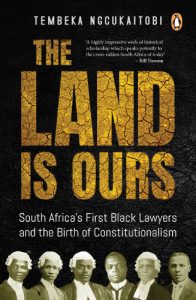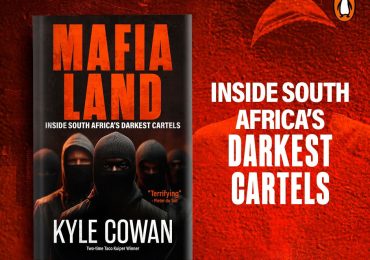The Land is Ours is Tembeka Ngcukaitobi’s first book, and it must not be his last, writes Perfect Hlongwane.

The Land is Ours: South Africa’s First Black Lawyers and the Birth of Constitutionalism
Tembeka Ngcukaitobi
Penguin Random House, 2018
The publication of Tembeka Ngcukaitobi’s The Land is Ours: South Africa’s First Black Lawyers and the Birth of Constitutionalism couldn’t be more timely, in the wake of the National Assembly’s adoption of a motion advocating land expropriation without compensation last week, by an overwhelming majority.
The book is said to be flying off the shelves, and no doubt the author’s reputation as a public interest lawyer has something to do with this. The nation watched as Ngcukaitobi meticulously picked apart Cyril Ramaphosa, now state president, under cross-examination during the commission of inquiry into the Marikana massacre in 2014. The advocate has also led several successful arguments at the Constitutional Court—including one where the court ruled that Parliament had failed in its duties to hold former president Jacob Zuma accountable for deriving personal benefits from the state-funded upgrades, ostensibly for security purposes, to his Nkandla home.
The book’s title alone is fuelling interest: it suggests that one of the country’s finest legal minds is tackling head-on the question of land, its ownership and its restitution being a highly charged and unresolved question in the post-apartheid era. For many Black people, the government’s failure to resolve the land question is emblematic of broader failures to bring about swift and necessary redress for the crimes of colonialism and apartheid. At present the matter has taken centre stage in Parliament, with the governing African National Congress and the Economic Freedom Fighters, the second-biggest opposition party, united in their determination to amend the constitution to free the state of its obligation to pay for land that indigenous people were dispossessed of through racist fiat—most notably the 1913 Native Land Act.
The fact that legal and constitutional constraints are often cited as reasons for the excruciatingly slow pace in land reform makes this the perfect subject for Ngcukaitobi, who has distinguished himself during his career by using his legal acumen to advance the cause of the disadvantaged. Who better to shed light on the burdens and constraints that we are continually told have to do with the law, which as legend would have it ‘cannot be rushed’, than this author?
I confess, then, that I set about reading the book expecting solutions and answers. But its subject matter is not at all what I anticipated, and its title is relevant only insofar as it traces the attempts of a particular set of learned persons, who collectively might be called the author’s professional forebears, to deal with land dispossession in South Africa. The book, in short, is the story of a group of Black lawyers, and a record of their engagement with this dispossession as it unfolded.
To draw attention to the difference between the book’s rather sensational title and its more temporal contents is not meant as a major criticism, however, for there is a great deal that one can learn from its pages. A historical approach cannot fail to open up the discussion about land and lay bare the salient facts, especially when those who prefer to obfuscate the issue tend to imply that the debate is stale, that it has to do with the events of hundreds of years ago, as opposed to the realities and legacies that are experienced by people today.
For one thing, the personal histories Ngcukaitobi surfaces put a human face on matters that are often diminished by politics and dialectic debate. And the inclusion of the stories of the ordinary people who were the lawyers’ clients makes the rendition of historical land dispossession more than merely factual: it takes you there as a witness, to watch as it happened.
Any hope the reader might have that an incisive, analytical discussion of how laws and the constitution can be used to resolve the land issue are quickly put to bed in the author’s Introduction. Ngcukaitobi states explicitly: ‘The pages that follow record the collective experiences of these [first Black] lawyers and explore the influences that animated them.’ Arresting title notwithstanding, it is best, then, to judge the book based on what it is and not on what one might have hoped it to be. And indeed even those impatient for solutions will find Ngcukaitobi’s approach useful, for it may be in looking behind us that the way forward becomes clear.
The period the author has chosen to focus on is the pre-1948 era—the era before the National Party came to power and introduced formal ‘apartheid’, though in practice versions of apartheid had obtained in South Africa for centuries—for the simple reason that it has gone largely unexamined, and with it the stories of those Black lawyers who grappled with cases of land dispossession. Taking this into account, the author’s bias cannot be ignored. What another writer may have rendered as a tale of woe, a story of repeated failures and frustrations, becomes, at the tip of Ngcukaitobi’s pen, a record of small, cumulative victories that can and must be celebrated, given the circumstances under which they were eked out.
Alternatives to constitutionalism are not the concern of this book, and early on the author states quite authoritatively his view that it is ‘clear that the unfinished struggle for land can only take place through a framework of law’. While acknowledging that land dispossession originally occurred through extra-legal and unconstitutional means, Ngcukaitobi does not explore the possibility of reversing such losses outside of the law, save for conceding, through the factual accounts of his subjects’ lives, that politics must be wedded to the law in any real pursuit of justice, for, as he is forced to admit, ‘In itself, law is never sufficient for justice.’ But he believes that the history of the first generation of Black lawyers in South Africa is central to the land question, because of how those legal eagles tried to ‘reconcile the law with political upheavals of the day’.
It is a great convenience for the author that Black lawyers have played leading roles in the history of this country. So prominently do they feature in the records of our political struggles that The Land Is Ours almost reads in places like a history of the ANC, and the other organisations that pressed the Black majority’s case in the first half of the twentieth century. It can be frustrating for the reader, who is seized with questions of how land restitution can be sped up, to follow the trajectory of Ngcukaitobi’s painstakingly historical accounts. But this approach is not without its benefits and flashes of insight.
For example, the history of the Xhosa and the Khoisan—who ‘had lived together and alongside each other for a much longer period before the establishment of the colony’, and whose ‘material, cultural, and spiritual worlds had intersected, overlapped and combined to the point of being indistinguishable’—immediately and forcefully refutes the counter-argument, which surfaces every few years under one guise or other, that the land was taken only from the San and the Khoi, and that the Bantu people have as little claim to it as the colonisers themselves.
It is interesting to note that Ngcukaitobi mentions but does not challenge the theory, promulgated by WEB Du Bois, of ‘the Talented Tenth’—the notion that it is only through the efforts of the best and most talented men (learning being equated with virtue) that liberty can be attained. This theory implicitly underpins Ngcukaitobi’s approach, but while occasions to interrogate it present themselves again and again he merely glosses them over. Even when historical accuracy demands that the author should detail instances of deceit and betrayal on the part of the Black lawyers in dealing with their less-learned clients, excuses are made for such conduct.
The first Black South African lawyer, Alfred Mangena, for instance, appears to have paid for his travel and study overseas through the unauthorised use of funds from an organisation of which he was treasurer. Although he indisputably argued many important cases, which Ngcukaitobi faithfully records, this same Mangena was later struck off the roll because of his inability to handle funds paid to him and entrusted to his care as a lawyer. Ngcukaitobi suggests, however, that it was in fact the burden of taking on cases with political overtones that destroyed Mangena’s legal practice and led to his disbarring.
It cannot be refuted that the contributions men like Mangena made were immense and went beyond the scope of the law. But a refusal to examine the ways in which they fell short—such as Mangena’s lack of financial probity—is unfortunate. In fact, reviewing their ethical failings candidly might have presented an opportunity for today’s generation of Black lawyers, and others advocating for racial justice, to understand the intimate link between public and private morality.
It was Mangena, together with Richard Msimang, another of the earliest Black lawyers, who cogently stated in a petition drawn up for the Ndebele in Rhodesia that even though they had lost their lands to a militarily superior foe, ‘the right of conquest is now repudiated by the civilised world’. In this they echoed the prescient constitutionalism of the very first Black man to be admitted as an attorney in South Africa, the Trinidadian Henry Sylvester Williams, who coined the term Pan-Africanism and of whom Ngcukaitobi observes: ‘He understood that the law was itself an empty shell if it was not suffused with justice.’
Although Msimang, like Mangena before him, experienced troubles relating to clients’ payments and unpaid dues to the Transvaal Law Society, Ngcukaitobi does an impressive job of outlining the importance of their contributions in the fight against the rampant racial oppression of the time—land dispossession making up a crucial part of this. By recording the cases and petitions that these men argued, the author concludes: ‘It is from realities such as these that a new future may be reimagined for South Africa.’ Some among us may respond that for the landless and impoverished majority, despite freedoms won and a new constitutional dispensation being put into effect, this future still exists only in the realm of the imagination.
Nevertheless, perhaps the most important dimension of Ngcukaitobi’s exploration of this, until now, poorly studied history is that it corrects certain erasures, particularly with respect to the role that women played in the resistance of the time. He describes how one of the strongest influences on Williams, before he left London and decided to set up his pioneering law practice in the Cape, was a black woman from Kimberley. Her name was Alice Victoria Kinloch, and she was in the United Kingdom by virtue of her marriage to a half-Scottish, half-Zulu man. She later separated from this Kinloch and returned to South Africa, marrying a Zulu man in Natal.
The story of Kinloch’s radicalism—how, for instance, she was one of the first Black people to protest against the evil of single-sex compounds—is nothing short of astonishing. Not only did she leave a deep and lasting impression on Williams, but she also saw through the duplicity of early missionaries at a time when men like John Tengo Jabavu, a prominent activist and newspaper editor, were predisposed to give them the benefit of the doubt. The story of Alice Victoria Kinloch also finds an echo when Ngcukaitobi details the importance and influence of Charlotte Maxeke two decades later.
It is without doubt the case that much can be learned from the lives that Ngcukaitobi writes about. The contributions of South Africa’s first Black lawyers should not be understated when the history of our land dispossession, and the heroic struggles that have been waged against it, are reckoned with. What these men achieved both legally and politically in the face of impossible odds counts as a marvel of history.
And yet, the juncture where the law intersects with politics remains a fundamentally unresolved issue lurking at the book’s heart—as the majority of our people’s ongoing exile from the land lurks at our country’s heart. Writing about ANC founder Pixley ka Isaka Seme, Ngcukaitobi notes that for him ‘there was no rigid separation between the law and the political context in which the law functioned’. It is for this very reason that one might have hoped for a more forward-looking thesis on the land question in South Africa today, nestled somewhere adjacent to Ngcukaitobi’s legal-historical overview of a history that we all hope will never repeat itself.
The Land is Ours is Ngcukaitobi’s first book, and this reviewer sincerely urges that it should not be his last. His suggestion that the answers to the land question and restitution lie within the confines of the law, even if the law itself alone is insufficient for justice, is a useful provocation, especially to those with ready access to the levers of law. However, in the meantime, so-called land invasions by poor, landless Black people continue, as do their evictions by the state’s anti-land-invasion units, and the destruction of the homes they’ve made on the vast tracts of open land owned by individuals, companies and the state. It’s almost as if the majority of South Africa’s natives wake up every day pariahs in the land of their birth, and have no choice for their survival but to continue their ancestors’ centuries-long struggle for a piece of ground.
- Perfect Hlongwane’s debut novel, Jozi, was published in 2013, and is now available in the Picador Africa Classics series. His second novel, Sanity Please Prevail, is due out in 2018. Read an excerpt here.






Alice Victoria Alexander was born in Cape Town, and moved with her parents to Kimberley, where she met her husband Edmund Ndosa Kinloch. Both Edmund and his father worked in the Kimberley mines, the latter died there, a pauper. Alice did not separate and remarry after returning from her visit to England: she and Edmund settled first at Verulam, then moved to Kenya in the 1920s, and finally in the 1930s to northern Tanzania, where Alice died in 1946.
hi robert do you happen to know any edmund alexander kinloch.
The land belongs to the indigenous people, not to Bantu and European settlers.